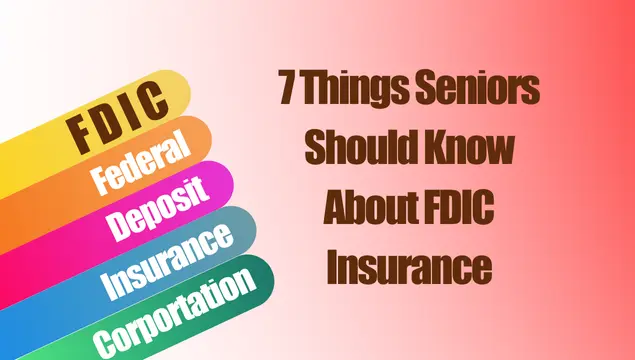As seniors approach their retirement for a long time, guaranteeing monetary security becomes a foremost concern. One key perspective of this security is understanding FDIC insurance and how it impacts your investment funds. The Federal Deposit Insurance Corporation (FDIC) is a free office of the United States government that ensures investors of guarantor banks found within the United States against the misfortune of their deposits on the off chance that a safety net provider bank comes up short. Here are 7 Things Seniors Should Know About FDIC Insurance.
1. What is FDIC Insurance?
FDIC insurance may be a government-backed ensure that ensures your deposits in member banks up to a certain limit. This scope is programmed after you open an account at an FDIC-insured bank, giving peace of intellect knowing your cash is secure. The standard insurance amount is $250,000 per depositor, per backup plan bank, for each account ownership category.
The History and Purpose of the FDIC
The FDIC was made in 1933 in reaction to the thousands of bank disappointments that happened during the 1920s and early 1930s. Its essential reason is to preserve open certainty and energize solidness within the money-related system through the advancement of sound managing and account practices. For seniors, understanding this history makes a difference in emphasizing the unwavering quality and significance of FDIC protections as a foundation of monetary security.
The Mechanics of FDIC Insurance
Once you deposit money in an FDIC-insured bank, your deposits are guarantor up to the greatest permitted by law. The FDIC uprising all sorts of deposits received at an insured bank, counting reserve funds accounts, checking accounts, money market deposit accounts (MMDAs), and certificates of the store (CDs). In any case, it’s fundamental to note that not all monetary items are secured, such as common reserves, annuities, life insurance policies, stocks, and bonds.
2. Coverage Limits and Account Categories
Understanding the coverage limits and how distinctive account categories influence your insurance is basic. The FDIC uprising deposits up to $250,000 per depositor, per backup plan bank, for each possession category. This implies you’ll be able to maximize your coverage by spreading your deposits over distinctive possession categories such as:
- Single Accounts: Owned by one person.
- Joint Accounts: Owned by two or more individuals.
- Retirement Accounts: Including IRAs and other tax-advantaged accounts.
- Trust Accounts: Revocable and irreversible trusts.
How to Maximize Your Coverage
By deliberately utilizing diverse account categories, you’ll be able to viably increment the sum of your insured deposits. For case, on the off chance that you have $250,000 in a single account and $250,000 in a joint account at the same bank, all $500,000 would be a safety net provider. Furthermore, on the off chance that you’ve got accounts in different ownership categories, such as a retirement account or a belief account, these can give partitioned insurance coverage.
3. Types of Accounts Covered
Not all accounts are secured similarly beneath FDIC insurance. It’s imperative to know which types of accounts are backup plans. The FDIC covers:
- Checking Accounts
- Savings Accounts
- Money Advertise Store Accounts (MMDAs)
- Certificates of Store (CDs)
Types of Accounts Not Covered
Understanding what FDIC insurance does not cover is similarly vital. Venture items like shared funds, annuities, life insurance policies, stocks, and bonds are not secured by FDIC insurance. This qualification is vital for seniors who may have broadened portfolios counting both safety net provider deposit accounts and speculation items.
Bank Products vs. Investment Products
The key contrast between bank products and investment products is the level of hazard and insurance coverage. Bank items like investment funds accounts and CDs are low-risk and secured by FDIC insurance, while investment products like stocks and common stores carry higher hazards and are not safety net providers. Seniors ought to guarantee they adjust their portfolios accordingly to ensure their investment funds while still accomplishing their investment objectives.
4. How FDIC Insurance Works During a Bank Failure
Within the uncommon occasion of a bank failure, the FDIC steps in to secure contributors. Here’s how it works:
- Immediate Coverage: The FDIC ordinarily gives access to your insured deposits within a couple of days of a bank closing.
- Transfer to Another Bank: Your account may be exchanged to another FDIC-insured bank where you’ll get to your reserves.
- Direct Payment: In some cases, the FDIC may issue a check for the insured amount specifically to you.
The Process of a Bank Failure
When a bank comes up short, the FDIC gets to be the “receiver” and takes control of the bank. The FDIC’s essential goal is to offer the fizzled bank’s resources and settle its obligations, counting paying back contributors. This preparation is ordinarily quick to play down disturbance and keep up open certainty within the keeping money framework.
Accessing Your Funds Post-Failure
For seniors, speedy getting to funds is basic. In most cases, contributors will have to get to their backup plan funds by another business day. The FDIC might transfer the deposits to another safety net provider bank, permitting clients to proceed to utilize their accounts as regular, or it may give coordinated installments.
5. How to Ensure All Your Funds Are Fully Protected
To guarantee all your funds are completely ensured, consider the following procedures:
- Diversify Accounts: Spread your funds over different FDIC-insured banks.
- Utilize Distinctive Ownership Categories: Use different account proprietorship categories to maximize scope.
- Stay Informed: Routinely survey your bank’s FDIC insurance status and keep abreast of changes in coverage limits and rules.
Strategies for Maximizing FDIC Coverage
Seniors can maximize their FDIC coverage by strategically opening accounts at diverse banks and completely different proprietorship categories. For occurrence, by having different accounts over a few banks, you’ll guarantee that each account benefits from the full $250,000 insurance limit.
Using Brokered Deposits and Other Financial Instruments
Another technique includes brokered deposits, where a broker places deposits on the sake of the depositor into different banks to guarantee full scope. Moreover, a few monetary teach offer administrations that naturally disperse your stores over numerous banks to maximize FDIC insurance.
6. The Importance of Keeping Records
Keeping up precise and up-to-date records of your accounts is imperative. Keep a list of all your bank accounts, their ownership status, and equalizations. This may assist you in rapidly determining how much of your cash is a safety net provider and guarantee that you simply do not surpass the insurance limits.
Organizing Your Financial Records
For seniors, organizing financial records can be a clear handle on the off chance that done routinely. Guarantee you’ve got clear documentation for each account, counting the sort of account, the proprietorship category, and the current adjustment. This hone not as it were makes a difference with FDIC insurance but also makes overseeing your funds simpler.
Regular Reviews and Updates
Frequently checking on and overhauling your records can prevent any oversights. Changes in account equalizations or the opening of modern accounts can influence your FDIC coverage. Keeping everything current guarantees you’re continuously mindful of your coverage status and can make vital alterations expeditiously.
7. Additional Insurance Options
Whereas FDIC insurance gives critical assurance, a few seniors may have stores that surpass the $250,000 constraint. In such cases, consider extra insurance options like:
- Deposit Brokerage Services: These services can offer assistance spread your deposits over numerous banks to maximize FDIC insurance
- Credit Union Insurance: Deposits in governmentally insured credit unions are secured by the National Credit Union Administration (NCUA) up to $250,000.
Brokered Deposits
Brokered deposits include employing a broker to put your funds into numerous banks to guarantee that all your deposits are completely safety net providers. This is often a valuable technique for seniors with huge entireties of cash because it rearranges the method of overseeing numerous accounts.
NCUA Insurance for Credit Unions
For those who favor credit unions, it’s imperative to note that deposits at governmentally safety net provider credit unions are secured by the NCUA up to $250,000 per depositor, per safety net provider credit union, for each account possession category. This gives comparative security to FDIC insurance and can be a practical elective.
Private Deposit Insurance
In expansion to FDIC and NCUA insurance, a few teachers offer private deposit insurance that gives extra scope past the standard $250,000 restrains. Whereas this may offer additional peace of intellect, it’s vital to get the terms and reliability of the private insurer.
Conclusion
FDIC insurance could be a pivotal component in shielding seniors’ reserve funds. By understanding the scope limits, sorts of accounts secured, and how to maximize assurance, seniors can guarantee their hard-earned cash remains secure. Routinely investigating your accounts and remaining educated about FDIC rules will help keep up your monetary peace of intellect. Whether you’re broadening your accounts, keeping detailed records, or investigating extra insurance alternatives, these steps are imperative in securing your money-related future.

I’m Lewis, an outstanding young talent in the vibrant world of blogging. With five years of experience at just 25, Lewis’ passion for writing and dedication to his craft is unmistakable. Through his engaging blog, Lewis shares unique insights, knowledge, and experiences, leaving a lasting impression on both his audience and the blogging community. Join Lewis on his journey of creativity and inspiration.
